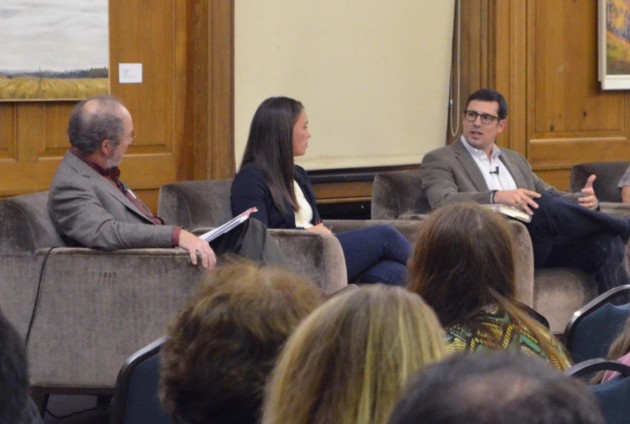
Craig Mullaney graduated second in his class from West Point, served in Afghanistan, attended Oxford College on a Rhodes Scholarship, worked in the Pentagon, worked with President Barack Obama's 2008 campaign staff, taught at the Naval Academy and wrote a bestselling memoir in 2009.
He is only 34 years old.
On Monday, the DePauw community had a chance to hear Mullaney's story first-hand when he spoke to students and faculty at the Union Building Ballroom.
"Craig Mullaney shares a compelling and important story that is different from stories that all of our students experienced," said Bob Steele, director of the Prindle Institute for Ethics. "This story takes us into important issues that we must pay attention to and must grapple with."
Mullaney's book, "The Unforgiving Minute: A Soldier's Education," spans approximately 10 years from his four years of training at the United States Military Academy at West Point to his Oxford education to meeting his wife to teaching at the Naval Academy - with much in between.
Mullaney's 2003 tour in Afghanistan with the United States Army has colored many other facets of his life, a fact that he brings to attention.
"The country is overly focused on the difficulties of returning veterans, yet there are those who are profoundly and permanently changed by their experiences," Mullaney said to the audience about the positive side of reintegrating soldiers into society. "That's a story that needs to be told."
Nonetheless, one of the leading experiences of warfare is loss. Mullaney detailed how he learned to cope with death in his military service.
"Being at the Academy during peacetime [brought the idea that] if you followed the play book, did what you were supposed to do and were well-trained, that you could come back with your platoon, that was a promise you could make," Mullaney said. "There's a lot of fog and uncertainty, elements well beyond your control, and those turned out to be arrogant presumptions."
Mullaney noted that grief was not often experienced until after reflection. There is an instinct to keep going that must be stressed. As a certain Academy training call-and-response saying dictates, 'there are two kinds of people - quick and dead.'"
"There's no pause button in combat," Mullaney said. "You just have to keep going. I had my duty to perform, and my men needed me...as much as they needed each other."
A specific firefight in Afghanistan resulted in the death of first-class Private Evan W. O'Neill, a soldier in his platoon.
"I don't know that I learned the most about myself as a leader at that time [of O'Neill's death]," Mullaney said. "It was mostly training that kicked in."
Only afterward in relative safety did Mullaney and other soldiers fully struggle with grief, anger, confusion and anxiety.
"The true test of leadership was in the days that followed," Mullaney said. "I went from thinking of how devastated I was to thinking about how O'Neill's team members [were] dealing with greater grief, anger and frustration than even I."
Three years of teaching at the Naval Academy and the process of writing his experiences helped Mullaney cope with his own memories of loss.
"It was therapeutic, but a part of the process is to reopen wounds," Mullaney said about writing the novel.
While a few students had read Mullaney's book for class in Steele's First Year seminar: 'This I Believe,' many others in attendance had not. This didn't stop them from enjoying his talk.
"He gave us [students] perspective on how it was to be a war veteran," senior Anne Rivelli said. "I haven't read his book, but now I want to."
Mullaney's book was a New York Times bestseller after its release in 2009. He currently lives in San Francisco and works for the Council on Foreign Relations.
